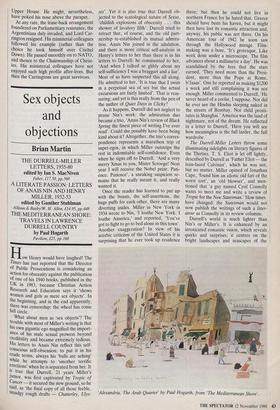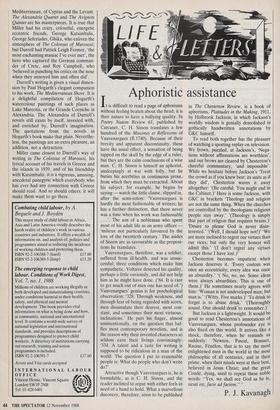Sex objects and objections
Brian Martin
THE DURRELL-MILLER LETTERS, 1935-80 edited by Ian S. MacNiven
Faber, £17.50, pp.560
A LITERATE PASSION: LETTERS OF ANAIS NIN AND HENRY MILLER, 1932-53 edited by Gunther Stuhlman
Allison & Busby/W. H. Allen, £14.95, pp.448
THE MEDITERRANEAN SHORE: TRAVELS IN LAWRENCE DURRELL COUNTRY by Paul Hogarth
Pavilion, f25, pp.160
How Henry would have laughed! The Times has just reported that the Director of Public Prosecutions is considering an action for obscenity against the publication of one of his 1940 books, published in the UK in 1983, because Christian Action Research and Education says it 'shows women and girls as mere sex objects'. In the beginning, and in the end apparently, there was censorship: the wheel has come full circle.
What about men as 'sex objects'? The trouble with most of Miller's writing is that his own gigantic ego magnified the import- ance of his male sexual prowess beyond credibility and became extremely tedious. His letters to Anais Nin reflect this self- conscious self-obsession: to put it in his crude terms, always his 'balls are aching' While he attempts to 'smother terrific ejections' when he is separated from her. It 1.s true that Durrell, 21 years Miller's Junior, was first captivated by Tropic of Cancer — it secured the new ground, so he said, as 'the final copy of all those feeble, smudgy rough drafts — Chatterley, Ulys- ses'. Yet it is also true that Durrell ob- jected to the scatological nature of Sexus, 'childish explosions of obscenity . . . this shower of lavatory filth'. Durrell tried to retract that, of course, and the old part- nership re-established its mutual admira- tion. Anais Nin joined in the adulation, and there is more critical self-analysis in Henry's letters to her than there is in his letters to Durrell: he commented to her, 'And when I talked so glibly about my self-sufficiency I was a braggart and a liar'. Most of us have suspected this all along. He admitted to her, `It is true that I swim in a perpetual sea of sex but the actual excursions are fairly limited'. That is reas- suring; and yet is this really from the pen of the author of Quiet Days in Clichy?
As it happens, Durrell did not neglect to praise Nin's work: the admiration duo became a trio, `Anais Nin's review of Black Spring the finest piece of writing I've ever read'. Could she possibly have been being kind about it? Altogether, the trio's corres- pondence represents a marathon trip of super-egos, in which Miller outstrips the rest in indomitable self-confidence. Even when he signs off to Durrell, 'And a very merry Xmas to you, Mister Scrooge! Next year I will receive the Nobel prize. Pati- ence. Patience', a sneaking suspicion re- mains that he really meant it, and really wanted it.
Once the reader has learned to put up with the boasts, the self-assertions, the huge puffs for each other, there are many diverting asides. Miller in New York in 1934 wrote to Nin, 'I loathe New York. I loathe America,' and reported, 'You've got to fight to go to bed alone in this town'. Another exaggeration? In view of his acerbic criticism of the United States it is surprising that he ever took up residence there; but then he could not live in northern France for he hated that. Greece should have been his haven, but it might then have lost its romantic attraction and, anyway, his public was not there. On his American tour of 1942 he soon saw through the Hollywood mirage. Film- making was a bore, 'It's grotesque. Like work done under a microscope. The film advances about a millimetre a day'. He was scandalised by the fees that the stars earned, 'They need more than the Presi- dent, more than the Pope at Rome, b'Jasus'. One he reported as making $1200 a week and still complaining it was not enough. Miller commented to Durrell, 'He never heard of a coolie, I suppose. Nor did he ever see the Hindus sleeping naked in the streets of Bombay. Nor child prosti- tutes in Shanghai.' America was the land of nightmare, not of the dream. He reflected in a letter to Durrell, 'Here you will see how meaningless is the full larder, the full wardrobe.'
The Durrell-Miller Letters throw some illuminating sidelights on literary figures of the Thirties. T. S. Eliot is let off lightly, described by Durrell as 'Father Eliot — the lean-faced Calvinist', which he was not, but no matter. Miller opined of Jonathan Cape, 'found him an idiotic old fart of the worst sort', an 'old blowser', and men- tioned that 'a guy named Cyril Connolly wants to meet me and write a review of Tropic for the New Statesman.' How times have changed: the Statesman would not now publish the writings of such a litter- ateur as Connolly in its review columns.
Durrell's world is much lighter than Nin's or Miller's. It is enhanced by an intoxicated romantic vision, which reveals quirks and surprises: it centres on the bright landscapes and seascapes of the 'Alexandria, The Arab Quarter' by Paul Hogarth, from The Mediterranean Shore'. Mediterranean, of Cyprus and the Levant. The Alexandria Quartet and The Avignon Quintet are his masterpieces. It is true that Miller had his crazy, colourful, energetic eccentric friends, George Katsimbalis, George Seferiades, Ghika, who enliven the atmosphere of The Colossus of Maroussi; but Durrell had Patrick Leigh Fermor, 'the most enchanting maniac I've ever met', the hero who captured the German comman- der of Crete, and Roy Campbell, who 'believed in punching his critics on the nose when they annoyed him and often did'.
Durrell's writing is given a visual dimen- sion by Paul Hogarth's elegant companion to his work, The Mediterranean Shore. It is a delightful compilation of Hogarth's watercolour paintings of such places as Lake Mareotis, or the Grande Corniche in Alexandria. The Alexandria of Dun-ell's novels still exists by itself, invested with, and enriched by, Durrell's imagination. The quotations from the novels in Hogarth's book make that plain. Neverthe- less, the paintings are an extra pleasure, an addition, not a detraction.
Miller came closest to Durrell's way of writing in The Colossus of Maroussi, his lyrical account of his travels in Greece and the islands in 1939, and of his friendship with Katsimbalis: it is a vigorous, amusing, anecdotal panegyric which everybody who has ever had any connection with Greece should read. And so should others: it will make them want to go there.











































































 Previous page
Previous page